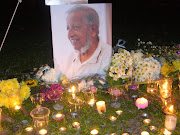Leading Rights Lawyer Faces Jail Term
By Baradan Kuppusamy
KUALA LUMPUR, Nov 25, 2008 (IPS) - Singapore’s embattled human rights lawyer and leading anti-death penalty campaigner, Ravi Madasamy, intends to defend his reputation "all the way" to the highest courts after being released on bail for allegedly causing a disturbance at a mosque.
On Aug 11, a Singapore judge ordered Ravi to be examined by the Institute of Mental Health after police arrested him on charges of harassment and causing a public disturbance during a prayer session.
Ravi, 40, who was discharged from the hospital earlier this month, remains on bail facing a possible three-year prison sentence, if found guilty.
Ravi has strenuously denied the charges and dismissed prosecution suggestions about his mental health. He represented himself in court as no lawyer in Singapore was prepared to take up his case.
Only a small group of committed local rights activists have rallied to his defence. The country’s Law Society, which took him to court for allegedly disrespecting a judge, leading to a one-year practicing suspension in 2007, has distanced itself from the case.
"I am saddened but I will continue my mission," Ravi told IPS. "The environment is increasingly tough and dangerous."
Charles Hector, a prominent Malaysian human rights lawyer, described Ravi as "a victim of state repression".
"The Malaysian Bar is closely monitoring his plight," Hector told IPS. "He is a defender of human rights and we are very concerned. We are taking up his victimisation internationally.
"The Singapore authorities should immediately end the persecution and respect Ravi’s right to free expression and advocacy to end mandatory death penalty."
Ravi has led a virtually one-man international campaign to save death row prisoners facing execution by hanging, mostly for drug trafficking in Singapore. He has also fought, in the courts and outside, to defend dissidents, persecuted opposition politicians, lawmakers and human rights activists. As a result he has been vilified and severely criticised by Singapore’s government-controlled mainstream media and often accused of being a publicity seeker.
"I face numerous other problems arising out of my activism," Ravi told IPS.
"With all the happenings I came under tremendous pressure. Because of the mounting problems my pace has slackened but my resolve is the same. I will press on to enlighten Singaporeans on the horrors of the death penalty. People should know that mandatory death penalty [impelling judges to sentence people to death in capital convictions] is a step backwards into a barbaric era. We must campaign and people should want to end it."
Ravi, who is also an author and manager of the anti-death penalty website Hung at Dawn first gained prominence in mid-2005 for trying to save death row inmate Shanmugam Murugesu, who was sentenced to death for possession of 1 kg of marijuana.
Murugesu, 38, a former military veteran and Singaporean civil servant, was arrested in August 2003 for carrying six packets of marijuana in his bags when returning home from Malaysia.
Under Singapore law, the death penalty is mandatory for possession of 500 gm of marijuana and 2 gm of heroin.
Before Murugesu’s execution on May 13, Ravi and a few supporters organised a three-hour vigil at a hall in the Furama Hotel. "It was the first time citizens had organised to speak against the arbitrary, biased and discriminatory death penalty law," Ravi said. "It was an eye opener for us all."
In 2004, Singapore, with a population of 4.3 million, had the highest per capita rate of state executions in the world, according to Amnesty International. From then on, Ravi represented other death row inmates in court. He also travelled the world speaking out against state repression and the mandatory death penalty in Singapore.
A colleague, requesting strict confidentiality, said police placed Ravi under strict surveillance. "They followed him, took photographs and filed reports," he told IPS. "The relentless scrutiny caused Ravi tremendous personal and professional stress."
Although on bail, Ravi has resumed practicing law until his trial date is set.
Last year, Singapore carried out two executions and sentenced two people to death, according to Amnesty.
This is the synopsis of Hung at Dawn, a book by M Ravi, published in 2005,

On what first seemed like just another day, a young Malaysian commuter-worker was arrested in Singapore in September 2001, a nation which has the highest per capita execution in the world (according to 2004 report by Amnesty International). The charge: drug-dealing. He had just handed an undercover narcotics agent a small bag packed with 27.65g of heroin and received $8,000 in return. But was he really a drug-dealer? The young man swore his innocence, insisting that he was only doing a favor for an old family friend, who had asked him to pass along some religious incense to an associate and collect some money from him.
From there, the young man went on a rapid plunge downward through the dark hole of a system he had little understanding of. He found himself facing a mandatory death penalty for dealing drugs and was dragged quickly through the few stages the Singapore justice system allows between arrest and execution: trial, the single appeal, and the clemency plea to the president – all to no avail.
The story might have ended right there for this young man, as it has for so many others found guilty of capital crimes in Singapore. It would have if not for a veteran human rights activist and a young lawyer who took up the cause and brought the young Malaysian's fight into legal areas never before dared in this tightly regulated city-state.
Hung At Dawn is the true story of the desperate fight to save this young man from a possible miscarriage of justice, veering around and leaping over all the roadblocks the legal system here sets up. It also tells the story of a second, even more well-known case the young lawyer fought in defence of a convicted drug-dealer two years later. This tale, also true in every detail, involves a charismatic figure who had risen from grinding poverty to become a kind of national hero in Singapore (having won a medal in the Jet-Ski World Championship), only to fall when personal problems led him to start using and dealing in soft drugs. Caught at a border crossing, this former hero was sentenced to die for possession of just over 1 kilo of cannabis!
The latter part of Hung At Dawn looks at the unprecedented campaign which Guardian described as a “high profile campaign” in their report entitled “Singapore finally finds a voice in death row protest”. To save this man's life, a campaign that stretched beyond the courts into the streets to engage the general Singapore public and brought together a wide coalition of people galvanized by this particular case and the wider struggle to bring Singapore's drug laws more into line with international humane standards.














3 comments:
"A colleague, requesting strict confidentiality, said police placed Ravi under strict surveillance. "They followed him, took photographs and filed reports," he told IPS. "The relentless scrutiny caused Ravi tremendous personal and professional stress."
Ths is normal and not surprising in Singapore. Two opposition members I personally know ahve also been followed everywhere they go, photographs taken, and reports filed. It has almost become an art for them.
"On Aug 11, a Singapore judge ordered Ravi to be examined by the Institute of Mental Health after police arrested him on charges of harassment and causing a public disturbance during a prayer session."
If Ravi does become mental, it will be because of this harrassment by the authorities, and not because he is unsound. perhaps the judge who ordered this should also be examined by the IMH.
One question though - why is Ravi advocating to end mandatory death penalty?
Obviously i can't speak on behalf of Ravi but this 2005 report from The Australian hopefully answers your question:
End mandatory hanging, says lawyer, Jake Lloyd-Smith in Singapore for AAP, 22 Nov 2005 (The Australian)
SINGAPORE should abandon its use of the mandatory death penalty, one of the city-state's top criminal defence lawyers said today.
Speaking ahead of next week's scheduled execution of Australian drug trafficker Van Tuong Nguyen, Subhas Anandan said if Singapore's courts had more discretion, the Melbourne man may have avoided death row.
"I am not opposed to the death sentence, but I am not in favour of the mandatory death sentence," Mr Subhas said.
Mr Subhas has handled more than 50 capital cases in Singapore in the past 35 years, and is regarded as one of the country's leading legal professionals.
Nguyen, 25, is set to be hanged at dawn on Friday December 2 after being caught with 396g of heroin while in transit at Changi Airport in 2002.
Singapore law mandates that those caught with more than 15g of heroin are deemed traffickers.
A judge must sentence someone to death if they are found guilty of trafficking.
Nguyen was convicted, lost his appeal and has now had all bids for clemency rejected by the Singapore authorities, including repeated appeals from the Australian Government.
Mr Subhas said it was essential that judges in Singapore be allowed to weigh the circumstances of each case when deciding an appropriate sentence.
The judge has to be able "to look at the circumstances in which things have been done," Mr Subhas said.
"Sometimes the reasons vary, so I think that the judge should be given the discretion whether to impose the death sentence or not," he said.
The comments put him at odds with the Singapore Government, which has consistently argued that compulsory use of the gallows is a vital part of its criminal justice system.
"Even in drug cases, there are cases where there are 15g, 20g, 1kg," Mr Subhas said.
"I am not saying that he (Nguyen) doesn't deserve the death sentence.
"I am saying that if judges are given the discretion he – along with many others – may not have got the death sentence."
Amid the mounting anger in Australia about Nguyen's likely fate, the use of mandatory death sentencing has also drawn fire from the United Nations.
Philip Alston, a Geneva-based Australian who monitors the death penalty for the world body, said last week that a black-and-white approach is entirely inappropriate where the life of the accused is at stake.
Mr Subhas is well known for his defence work.
One tabloid dubbed him "public defender number one" for his high profile work.
Singapore also imposes the mandatory death sentence for murder, certain firearms offences and kidnapping.
Amnesty International has said the country probably executes more people relative to its size that any other state worldwide.
There apparently seems to be a problem with the new style of leaving comments by Blogger. Those who post their comments with their website/blog URL have the links go nowhere.
In any case, this is soojenn's blog: http://www.soojenn.blogspot.com/
Post a Comment